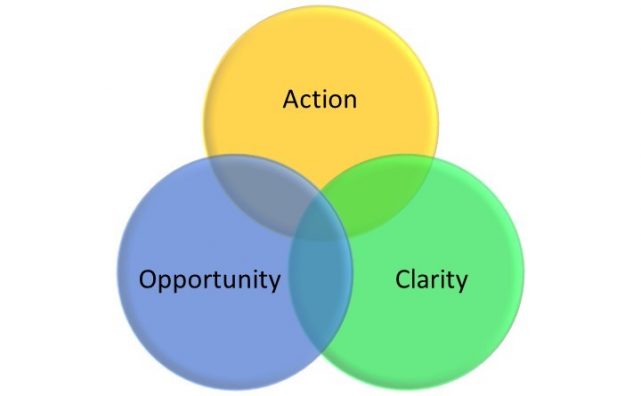
Behold a sower went forth again to sow. And as he sowed, some seeds fell on the well-worn path. Knowing the vulnerability of the seed to the birds, the sower broke the hardened ground to enable the seed to grow. The birds came to search for food and found nothing there.
Others fell on the rocky places, where they did not have much soil. Knowing the vulnerability of the plant to the scorching sun, the sower dug out the rocks to deepen the roots. The seeds sprang up, but only when the roots went down. And when the sun had risen, the deep roots nourished the plant with life and strength.
Others fell among the thorns. Knowing the vulnerability of the plant to be choked and fruitless because of the thorns, the sower diligently weeded the field.
And others fell on the good soil and yielded a crop, some a hundredfold, some sixty, and some thirty. Knowing the potential of the seed to multiply, the sower ruthlessly pruned the plant to make it even more fruitful.
He who has ears, let him hear. [click to continue…]

Interesting question came across my radar last week. Ashton was in a room full of worship leaders for a nationwide series of summer camps. For 8 weeks they will be leading the same songs, doing the same things, week after week. Her question:
What advice would you give to us on how to remain renewed and refreshed every week? How do we not get into a cycle? Even when it is week 4 for us and we have sung the same songs every week… how do we fight that?
It’s a valid question, and the Fuge worship leaders aren’t the only ones who face it. The truth is, everybody in spiritual leadership has the task of “handling the holy things” week in and week out. Ashton’s “holy things” may be music and microphones. Yours may be a Bible or a lesson plan. Someone else’s may be the routine schedule of meetings you attend or lead. Regardless, Christians gathered in the name of Christ for any reason have an occasion to invite and expect His presence.
Until we don’t.
Until we drift into a routine or rut – what Ashton calls a “cycle.”
Now it’s time for this. Next – that. Then back to this. Then the other. Before long, not only can we get bored with the whole thing, we telegraph that boredom to the very people we’re supposed to be leading. As a result, the “gospel” no longer feels like “good news” and we lose our sense of wonder and gratitude.
(If that sound a lot like your Sunday morning experience, I’m sorry. But I’m here to tell you it doesn’t have to remain that way.)
My response to Ashton was one of those things that startled me with how fast it came. (That’s usually a sign that I didn’t originate the answer.) The key to avoiding the rut: Play, Stay, Away, and Pray. [click to continue…]

In the world of archery, comfortable bows never launch arrows.
Until the bow is stretched to near-breaking, the arrow never fulfills its purpose or reaches its target.
I fear that our craving for comfort may be slowly killing us all because we’ve redefined the term. [click to continue…]

So Jesus said to them, “For a little while longer the Light is among you. Walk while you have the Light, so that darkness will not overtake you; he who walks in the darkness does not know where he goes (John 12:35).
There is clarity (Light).
There is opportunity (a limited time).
There is action (walk).
Clarity without opportunity calls for waiting, not walking.
Opportunity without clarity calls for caution and connection.
When clarity and opportunity converge, this calls for action. [click to continue…]

Imagine your life as various points on the highway. Fast Lane, Slow Lane, Shoulder, Ditch.
And at any given time, in any given area, you can be in one of those four.
Living in the Fast Lane means you’re getting where you’re going. You’re fulfilling your purpose.
In the Slow Lane you have a lot of movement, but you never quite seem to get there, wherever “there” is.
On the Shoulder, your “engine” is running, but you’re not moving ahead at all.
In the Ditch means you’ve crashed or are stuck, and without help you aren’t going anywhere.
Having punched my card in all four locations, I can tell you we’re all a mixed bag. You can be idling on the shoulder in one area, cruising in another, and crashed out in a third. So let’s break it down a little more. [click to continue…]

A.W. Tozer, in commenting on the difference between a yesterday and a today faith, wrote this:
We habitually stand in our now and look back by faith to see the past filled with God. We look forward and see Him inhabiting our future; but our now is uninhabited except for ourselves. Thus we are guilty of a kind of [temporary] atheism which leaves us alone in the universe while, for the time, God is not. We talk of Him much and loudly, but we secretly think of Him as being absent, and we think of ourselves as inhabiting a parenthetic interval between the God who was and the God who will be. And we are lonely with an ancient and cosmic loneliness.
Your capacity to believe God is the gateway to a life of power, usefulness, and joy. And yet during his earthly ministry, nothing caught Jesus by surprise more than the “people of God” or so-called “believers” not believing – living with that cosmic loneliness that Tozer wrote about.
“Where is your faith?” He would ask. [click to continue…]

Everybody leads from the second chair. Everybody.
Kings and queens.
Presidents and popes.
CEOs and C-3POs.
Even Messiahs. [click to continue…]

Don’t miss the miracle.
Don’t get fixated on the “only one way” to find light and life and healing and power. Don’t let the miraculous wonder pass you by while you wait for things to be done your way, or the way they’ve always been done in the past.
Listen for the call.
Hear the voice of compassion.
Let faith arise and take Him at His word.
Step boldly in the direction of your dreams and His power.
Find glory in a Father who doesn’t abide by your limited expectations. [click to continue…]

It’s the elephant in your room. It may well be the first thing that people who know you think of when asked about you. But maybe it’s been a part of your architecture so long, you’ve put a lamp shade on it and called it decorations.
I’m talking about something all of us have. The things we wish were different, but check back with us five years from now and our “elephant” is still there. It’s what I call our PWGA. The Problem that Won’t Go Away.
You may refer to it in different language. You may use words like “weakness,” or “cross to bear.” By now you may address it as the “same old same old” or as I did once in reference to my New Year’s resolutions: “Oh, you know, the usual.”
For many people, their PWGA is something that is heart-rending. Something they’ve asked or even begged God to fix, heal, or otherwise change. And yet the PWGA remains.
For other people, a PWGA is a problem requiring a solution they aren’t willing to apply. I know two words that can fix some people’s PWGA: “I’m sorry.” Or their nuclear cousin: “I was wrong.” But that’s too high a price for some people to pay. They’d rather live with the problem.
Some people have PWGAs that they are convinced have solutions. But they haven’t yet found those solutions and don’t know how to leverage their relationship with God to address it.
By now you probably have one or more of your own PWGAs floating around in your mind. Hold that thought. I want to introduce you to another guy. [click to continue…]

Once upon a time, long ago a man was sent on a mission. His responsibilities were clearly laid out and for a while he kept them. But one night he went for a walk and found himself lost.
Lost.
And in the domain of a foreign kingdom.
He was hungry. He was tired. He no longer had the resources provided for him by those who sent him. So he asked for help from the kingdom where he was a trespasser.
That didn’t go well. [click to continue…]









